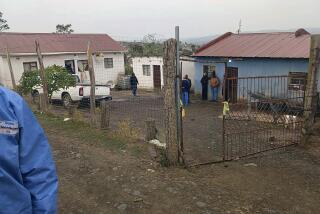S. African Police Seize 425 in Black Townships
- Share via
JOHANNESBURG, South Africa — Backed by hundreds of combat troops, South African police arrested 425 people Thursday in pre-dawn raids on two black townships where normal police patrols had been curtailed for months by continuing unrest.
At Parys, 65 miles southwest of Johannesburg in the Orange Free State, 341 persons were arrested as heavily armed troops cordoned off the city’s black township and police searched for wanted persons. Outside Port Elizabeth in troubled eastern Cape province, 84 more blacks were arrested in a second “crime sweep,” as the police called it.
All those arrested were charged with such crimes as burglary, aggravated assault, rape, possession of stolen property, drunken driving, marijuana sales and moonshining, according to a police headquarters spokesman in Pretoria, rather than with violations of South Africa’s severe internal security laws.
Police said no clashes occurred during the operations Thursday morning and that house-to-house searches, frequently used in past “seal-and-search missions,” had not been necessary.
Months of Unrest
The raids showed the extent to which nine months of unrest and deepening black hostility have prevented normal government administration and policing of many black ghetto townships outside South African cities.
Military assistance was required in a number of earlier police actions to restore basic municipal services, such as water supplies and trash collection, because the townships had become too dangerous for city workers.
In a related development Thursday, the main hospital serving Soweto, Johannesburg’s sprawling black suburb, began using military armored personnel carriers, painted white with a red cross on each side, in place of ambulances and other medical vehicles that had been attacked during the continuing unrest.
Dr. Koos Bekers, superintendent of the Baragwanath Hospital’s community health service, said its ambulances, buses and trucks had been stoned, firebombed and hijacked in recent weeks, bringing the decision to switch to the military vehicles, which are designed to withstand rifle fire, hand grenades and land mines.
The Baragwanath action drew immediate criticism from Dr. Abu Asvat, medical secretary of the Azanian People’s Organization, who protested, “Soweto is being turned into a war zone.”
Military Helps Police
Louis le Grange, the minister for law and order, acknowledged in an interview published here Thursday that the police are no longer in total control, as he had claimed before, and need increasing military assistance to cope with the black unrest, which has cost more than 360 lives since September.
“I can’t really say we are in full control of all unrest situations,” Le Grange told the weekly news magazine Financial Mail. “That is not normally possible. But I’m satisfied the South African police are generally in control of the situation. . . .
“Troops are being used in a supportive role, which we certainly welcome because we haven’t always got enough men available to cope with all circumstances.”
Le Grange added, however, that he believes the unrest is “leveling off” because of various police measures, ranging from bans on some anti-government meetings and calculated shows of force to more cautious patroling in the townships.
More to Read
Sign up for Essential California
The most important California stories and recommendations in your inbox every morning.
You may occasionally receive promotional content from the Los Angeles Times.










